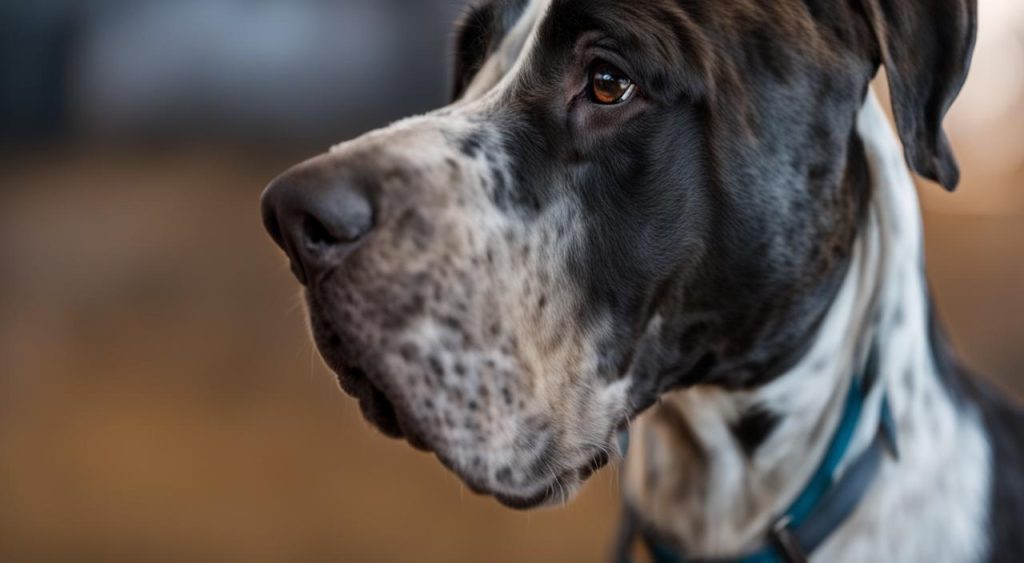Great Danes are majestic and gentle giants that capture the hearts of dog lovers. However, like any other living being, they are not immune to health issues. In this article, we will explore the common illnesses and health issues that Great Danes may face, as well as provide valuable tips on caring for a sick Great Dane and preventing illnesses.
Key Takeaways:
- Great Danes are prone to various health conditions, including bloat, cardiomyopathy, joint and bone diseases, and thyroid problems.
- Bloat is a dangerous and potentially fatal condition that affects the stomach and is common in Great Danes.
- Regular veterinary care and preventive measures, such as a balanced diet and joint supplements, can help manage and prevent common health issues in Great Danes.
- When caring for a sick Great Dane, it is essential to provide proper veterinary care and follow the advice of your veterinarian.
- Preventive measures, such as a healthy diet, regular exercise, and proactive management of potential health issues, can help prevent illness in Great Danes.
Common Health Problems in Great Danes
Great Danes are prone to several common health problems. One of the most significant issues they face is bloat, a condition that affects the stomach and can be life-threatening. This condition occurs when the stomach fills with gas or fluid and becomes twisted, causing severe discomfort and potential organ damage.
In addition to bloat, Great Danes are also at risk for cardiomyopathy, a disease that affects the heart muscle and can lead to heart failure. Joint and bone diseases, such as hip dysplasia, are also common in this breed, causing pain and mobility issues. Great Danes are also susceptible to thyroid problems, which can impact their overall health and well-being.
Regular veterinary check-ups are crucial for Great Danes to monitor their health and detect any potential problems early on. Providing them with appropriate preventive measures is equally important. A balanced diet, tailored to their specific nutritional needs, can help support their immune system and overall health. Additionally, giving them joint supplements can help alleviate any joint or bone issues they may experience.
By being proactive in managing the common health problems that affect Great Danes, you can ensure your beloved pet remains healthy and happy for years to come.
Caring for a Sick Great Dane
When it comes to caring for a sick Great Dane, providing proper veterinary care is essential. It’s important to consult with your veterinarian and closely follow their advice to ensure your dog receives the appropriate treatment. This may include medication, treatment plans, and regular check-ups to monitor their progress.
Aside from veterinary care, there are several proactive measures you can take to prevent illness in your Great Dane and promote their overall health and well-being. A healthy diet plays a crucial role in their immune system and can help prevent certain illnesses. It’s important to provide them with a balanced and nutritious diet tailored to their specific needs.
Regular exercise is another important aspect of Great Dane healthcare. Exercise helps maintain their weight, strengthens their muscles, and improves their overall fitness. However, it’s important to be mindful of their exercise tolerance and not overexert them, especially if they are already unwell or recovering from an injury.
“Proactive management of potential health issues is key to preventing illness in Great Danes. Keep an eye out for any signs of discomfort or changes in behavior, and promptly address any concerns with your veterinarian.”
Additionally, unique healthcare needs may arise as the Great Dane ages. Regular preventive exams can help identify potential issues early on and enable timely interventions. These examinations encompass a thorough physical examination, routine vaccinations, parasite prevention, and dental care.
Another important aspect of caring for a sick Great Dane is providing a calm and comfortable environment for your dog to recover. This includes ensuring they have a designated area where they can rest and heal, away from noise and excessive activity.
In conclusion, caring for a sick Great Dane requires proper veterinary care, including medication, treatment plans, and regular check-ups. However, prevention is equally important in maintaining their health and well-being. By providing a nutritious diet, regular exercise, and proactive management of potential health issues, you can help prevent illness in Great Danes and promote their overall health and happiness.
Conclusion
Great Danes are known to be prone to various health issues that can significantly impact their lifespan. Common ailments in Great Danes include bloat, cardiomyopathy, joint and bone diseases, and thyroid problems. However, by prioritizing their healthcare and following a few essential tips, you can help improve their overall well-being and potentially extend their lifespan.
Regular veterinary check-ups are crucial for identifying and addressing any potential health issues early on. Additionally, preventive measures such as a balanced diet, regular exercise, and appropriate supplements can strengthen their immune system and promote their overall health. Ensure you provide them with a nutritious diet that meets their specific nutritional needs and avoids food that may trigger health issues.
It’s also important to be proactive in caring for a sick Great Dane. Follow your veterinarian’s advice and administer any prescribed medications or treatments diligently. By proactively managing potential health problems, you can help prevent the onset of illnesses and provide your Great Dane with a healthier and happier life.
In conclusion, by prioritizing proper veterinary care, preventive measures, and a healthy and active lifestyle, you can ensure the well-being of your Great Dane. By being proactive, you can significantly reduce the risk of common illnesses, improve their immune system, and promote their overall health and longevity.





